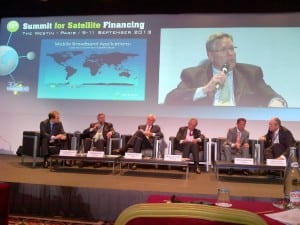Latest News
[Paris 09-11-13] The “Global satellite operators: Investment strategies for sustained growth” panel at the World Satellite Business Week in Paris saw the CEOs of Intelsat, SES, Eutelsat, Telesat, and Astrium Services debate the key issues facing some of the powerhouses in the satellite sector. In terms of ultra-HD and its future in the industry, they were all pretty optimistic about it.
“I don’t know that ultra-HD will be a sizeable market but we are convinced about ultra-HD in a way we were not [about] 3-D TV. We are convinced that in the mid to long term, ultra-HD will a consistent growth engine for us,” said Michel de Rosen, CEO Eutelsat.
Dave McGlade, CEO, Intelsat, added, “In the next three-plus years, we think we will see adoption of 4K. Ultimately, that will propagate around the world.”
Despite the onset of OTT offerings around the world, particularly in developed markets, all the CEOs remained optimistic that video would remain a key growth driver, and that the satellite industry should not be unduly concerned by what is happening in the OTT world. “DTH comes well ahead of all the others. I believe there will be growth in all the markets for DTH … We are targeting markets with the highest population. Satellite is the only way in markets such as Indonesia and the Philippines for DTH. We will also see the analog switch-off take place in countries across Africa, fueling the need for satellite bandwidth. The video distribution business justifies our investment in new satellites,” said Romain Bausch, CEO, SES.
One question the panel was asked was to identify one country that they felt would offer a great growth opportunity for their company. The caveat being they could not mention the same country that one of the other CEOs had mentioned. Interestingly, Bausch highlighted Indonesia as offering great opportunities for SES; McGlade spoke of India as a market ripe for potential once regulatory issues were resolved; Dan Goldberg, Telesat’s CEO, highlighted Mexico; and de Rosen said Brazil was a huge potential market for Eutelsat.
In terms of struggles and challenges for the FSS sector, government surfaced in the conversation but McGlade, while admitting it had been a challenging time, believes things could be on the cusp of change. “Certainly, in the short term, we see the pressures of sequestration. but changes will happen,” he said. “We see a future that will have government expanding in the long-term, but being pressured in the short-term. There are forces that want to do things the way they have always done. The demand is there, but the money is not there in the short term. However, we have two long-term RFPs from government customers. This is not the time to give up – it often gets darkest before the dawn.”
De Rosen added that one factor that is slowing down growth in the milsatcom market is peace. “But, who can complain about this?” he said. Another factor he mentioned is, of course, sequestration. “However, there are positive factors such as the fact that government officials do want satellites. It is a crucial way they operate. They want to rely more on commercial operators like us. We are now seeing in other parts of the world, other countries, wanting to have more satellite capacity, and being quite creative in how they do this,” he said.
Additionally, Goldberg highlighted the recent M&A activity involving the likes of Eutelsat and Satmex, and Arabsat and Hellas-Sat, as being indicators of an industry on a positive upswing. “What I have been intrigued is an upswing in some corporate activities,” he said. “We were pleased to see Intelsat has its IPO. It is good to have another big publicly listed company in the United States. A pick-up of M&A activity has been interesting to see.”
CTO Breakfast
In the “Future of Video: Technologies needed to address changing markets” technology breakfast, CTOs from Intelsat, Eutelsat and Measat Satellite Systems looked at the technical issues facing the FSS sector. Thierry Guillemin, CTO, Intelsat, said the internationalization of content was creating more opportunities for the FSS sector, and more demand for bandwidth across the board. He cited Discovery Networks International as a key example and said they were now distributing multiple different language versions of their channels across Asia. He also said “the jury was still out” on the potential impact of OTT to the traditional satellite video business.
In terms of ultra-HD, all members of the panel spoke positively about it. Ali Ebadi, senior vice president, space systems development, Measat, said the World Cup in Brazil next year would likely be a tipping point for this technology, and that he was “optimistic” that ultra-HD had a bright future and the satellite industry was poised to take advantage of this.
Flexible payloads and High Throughput Satellites (HTS) were also key points of discussion. Ebadi shared with the audience that Measat has an RFP out for a new HTS, and that this satellite will likely be a mix of Ku- and Ka-band, and be ultimately a 26-month program for the company.
Guillemin said that with the advances in technology satellite was becoming “cool again.” He highlighted the importance of flexibility for the operator when commissioning new satellites, and that manufacturers’ have responded “well” to operator demands, particularly in terms of having more flexibility. With so much demand for video, Guillemin said this would only stress the demand for HTS and that the industry was undergoing an “exciting evolution” to meet these challenges.
Get the latest Via Satellite news!
Subscribe Now